Russia Ukraine conflict live updates: China slams NATO over conflict’s ‘breaking point’, UK bans all Russian aircraft
China has accused NATO of building tension between Ukraine and Russia to “breaking point” before the latter’s eventual invasion in late February.
World
Don't miss out on the headlines from World. Followed categories will be added to My News.
Russia’s invasion of Ukraine has entered its 13th day, with Moscow troops ramping up attacks on several major cities, including Kyiv.
Russian forces have reportedly launched hundreds of missiles and artillery attacks on residential areas of Chernihiv and Mykolaiv, with Ukrainian forces also defending the port city of Odessa from invading ships.
Russian forces are still pushing their way forward to Kyiv, with soldiers and citizens alike setting up hundreds of checkpoints in a bid to protect the city.
Promises of ceasefires from Russia to allow citizens to evacuate through humanitarian corridors have been marred with claims that Ukrainian citizens are being targeted and killed as they attempt to flee.
Hundreds of people have been killed in the ongoing conflict and thousands injured.
Stream the latest on the invasion of Ukraine from the world’s most trusted news sources with Flash. 25+ news channels in 1 place. New to Flash? Try 1 month free. Offer ends October 31, 2022 >
Read on for the latest updates.
China accuses NATO of pushing nations to ‘breaking point’
China has accused NATO of building tension between Ukraine and Russia to “breaking point” before the latter’s eventual invasion in late February.
Speaking at a daily news briefing, Chinese foreign ministry spokesman Zhao Lijian urged the West against continuing its brutal sanctions against Russia.
Mr Zhao claimed “wielding the stick of sanctions at every turn will never bring peace and security, but cause serious difficulties to the economies and livelihoods of the countries concerned”.
China this week announced its relationship with Russia was “rock solid” despite ongoing attacks against Ukraine civilians in what has been a brutal culmination of over eight years’ conflict over territory.
Mr Zhao said China and Russia will “continue to carry out normal trade cooperation, including oil and gas trade, in the spirit of mutual respect, equality and mutual benefit”.
On the same day, China also announced it would send over 5 million yuan (A$1.08m) in humanitarian aid to Ukraine civilians.
NASA images reveal Ukraine blackout
Incredible images taken from space have revealed a glimpse of the impact of the war in Ukraine, showing the country sitting the dark as conflict rages across the nation.
The first image, taken on February 7th two weeks before the invasion, shows business as usual. However, in the second image taken exactly a month later, only flecks of light can be seen emanating from major cities, but most regional areas sit completely without light.
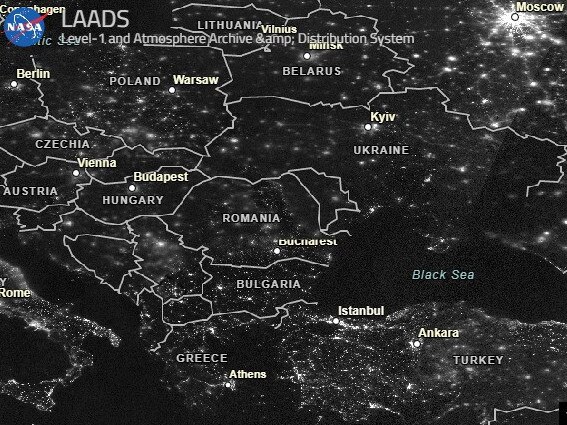
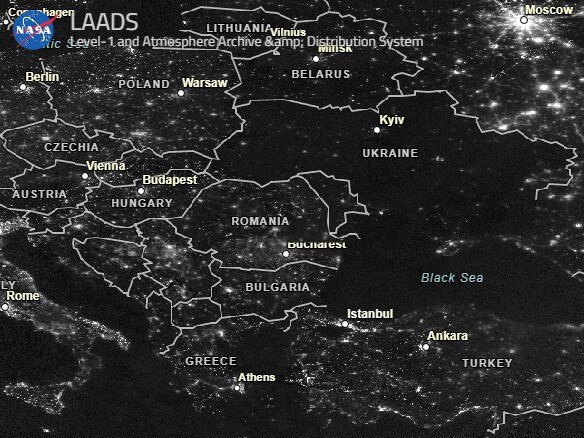
Despite the heavy blackout over Ukraine, Kyiv Deputy Mayor Mykola Povoroznyk announced on Wednesday the capital’s heat, water and power supplies, and phone lines were still working normally, despite taking heavy fire in recent weeks.
Mr Povoroznyk said authorities were working hard on evacuating civilians across the country, assuring the capital had provisions for regional refugees.
“We have places to house (refugees), we have trains to send people west,” he said in a television address.
10 killed in strike, ceasefire announced for today
A Ukrainian official for the Luhansk region has revealed 10 people were killed in the eastern town of Severodonestk, after Russian forces allegedly “opened fire” on residential homes.
The Kyiv Independent reported Ukraine and Russia have organised a temporary ceasefire to evacuate civilians from 10 cities on March 9.
The routes include Enerhodar and Mariupol to Zaporizhzhia, from Sumy to Poltava, from Izium to Lozova, from Volnovakha to Pokrovsk, from Vorzel, Borodianka, Bucha, Irpin, and Hostomel to Kyiv.
UK bans Russian aircraft
UK foreign secretary Liz Truss has announced new sanctions banning Russian aircraft from its airspace.
The includes any aircraft owned, operated or chartered by anyone connected to Russia.
“Banning Russian flagged planes from the UK and making it a criminal offence to fly them will inflict more economic pain on Russia and those close to the Kremlin,” Ms Truss said via Sky News.
“We will continue to support Ukraine diplomatically, economically and defensively in the face of Putin’s illegal invasion, and work to isolate Russia on the international stage.”
Kyiv wakes to more air raid sirens
Civilians still trapped in Kyiv were awakened by early morning air raid sirens on Wednesday
According to the Kyiv Independent, the city’s regional administration head Oleksiy Kuleba sent out an urgent alert saying warning there was a "threat of a missile attack" on the Ukrainian capital.
“Everyone immediately to shelters,” he said.
Russian artillery has been heavily attacking the outskirts of the capital, with one Ukrainian soldier reporting fighting had devolved to “hand-to-hand” combat in the streets.
Ukrainian President Volodymyr Zelensky is understood to be in the capital after posting his first video from his office since the beginning of the invasion on Tuesday.
Problems ahead as springtime thaw looms
Having failed to make a decisive advance in the early phase of its Ukraine campaign, the Russian army is now facing a thaw that could make progression on key routes problematic due to mud.
Like the armies of Napoleon and Hitler before them, Russian mechanised divisions are likely to be slowed down or halted as unpaved roads become treacherous quagmires.
“Early spring is a bad time to invade Ukraine if the main roads have been destroyed, a task well within Ukraine’s irregular warfare toolkit,” professor Spencer Meredith from the US National Defence University wrote in an article.
Pictures of Russian tanks stuck in the mud have already begun to filter through social media, as the invasion enters its third week today.
Worsening conditions will leave Russian generals little choice but to order tanks and armoured vehicles to stick to the main roads, making them more vulnerable to attack, according to analysts.
“There were already numerous episodes when Russian tanks and other equipment drove into the fields and got stuck. So the soldiers had to leave the equipment and go on foot,” Ukrainian military analyst Mykola Beleskov said.
“The situation will worsen as the weather warms up and the rains start, it’ll just chain them to the ground.”
- AFP
300,000 under siege: Russia holds Ukrainian city hostage
Fears are growing for residents stuck in the Mariupol, a city subject to heavy fire in Ukraine’s south east. The port city has been under siege for eight days, despite multiple attempts for a ceasefire.
According to the city’s Mayor, Vadim Boychenko, citizens have “practically” no access to electricity, telecommunications access, heating, food or water. Mr Boychenko also claimed that a six-year-girl had died of dehydration after her home had been destroyed.
“In the last minutes of her life she was alone, exhausted, frightened and terribly thirsty,” he said from the city’s Telegram account. “This is just one of the many stories of Mariupol, which has been surviving a blockade for eight days.”
Russian troops have been gradually surrounding Ukraine’s capital city of Kyiv since they invaded on February 24. Currently they have surrounded the eastern, northwestern, and western outskirts of the city.
On Tuesday, Washington think tank, the Institute for the Study of War predicted that Russian forces would storm the capital “in the coming 24-96 hours”.
The update said that Russian troops were struggling to “assemble sufficient conventional combat power to launch its assault on the capital”.
Loud series of explosions heard from Kyiv and surrounding area right now. Kyiv city just put out another siren alert to seek shelter immediately. The explosions have been incessant for three minutes.
— Christopher Miller (@ChristopherJM) March 9, 2022
Russia holds 300k civilians hostage in Mariupol, prevents humanitarian evacuation despite agreements with ICRC mediation. One child died of dehydration (!) yesterday! War crimes are part of Russia’s deliberate strategy. I urge all states to publicly demand: RUSSIA, LET PEOPLE GO!
— Dmytro Kuleba (@DmytroKuleba) March 8, 2022
Putin’s ‘extremely unusual’ move terrifying the world
Russian President Vladimir Putin is using nuclear “blackmail” to keep the international community from interfering in his Ukraine invasion, the head of the Nobel prize-winning group ICAN said.
“This is one of the scariest moments really when it comes to nuclear weapons,” Beatrice Fihn, who leads the International Campaign to Abolish Nuclear Weapons, told AFP in an interview Tuesday.
The 40-year-old Swede, who has spearheaded the group’s global efforts to ban the weapons of mass destruction since 2013, said she had never in her lifetime seen the nuclear threat level so high.
“It is incredibly worrying and overwhelming.”
Just days after Russia launched its full-scale invasion of its pro-Western neighbour on February 24, Putin ordered his country’s nuclear forces to be put on high alert, sparking global alarm.
Addressing the US Congress on Tuesday, Avril Haines, US Director of National Intelligence, described Putin’s move as “extremely unusual”.
“We have not seen a public announcement from the Russians regarding a heightened nuclear alert status since the 1960s,” she pointed out.
Fihn described the move as “extremely dangerous”.
“Not only is this meant to instil fear in the whole world; it’s also meant to scare anyone from helping in Ukraine,” he said.
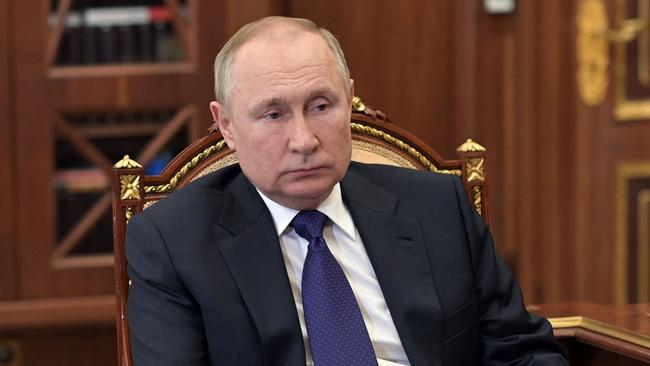
‘Ceasefire violated’ in Mariupol
On Wednesday morning, a spokesman for Ukraine’s Ministry of Foreign Affairs, Oleg Nikolenko claims Russians forces attempted to attack citizens who tried to flee Mariupol.
Local officials also believe evacuation routes out of the city have been mined.
“Ceasefire violated! Russian forces are now shelling the humanitarian corridor from Zaporizhzhia to Mariupol,” tweeted Mr Nikolenko. “8 trucks + 30 buses ready to deliver humanitarian aid to Mariupol and to evac civilians to Zaporizhzhia. Pressure on Russia MUST step up to make it uphold its commitments.”
Ceasefire violated! Russian forces are now shelling the humanitarian corridor from Zaporizhzhia to Mariupol. 8 trucks + 30 buses ready to deliver humanitarian aid to Mariupol and to evac civilians to Zaporizhzhia. Pressure on Russia MUST step up to make it uphold its commitments.
— Oleg Nikolenko (@OlegNikolenko_) March 8, 2022
So far, the only humanitarian corridor that has been co-ordinated by Russian and Ukrainian forces has taken place in the city of Sumy in Ukraine’s northeast.
Citizens were given until 9pm on Tuesday night to leave to Poltava Oblast in central Ukraine, roughly 177kms away, CNN reports.
On Wednesday afternoon, the head of the Poltava Regional Military Administration Dmytro Lunin confirmed 5000 people had been successfully evacuated.
Sumy’s regional head, Dmitry Zhyvitsky, issued a stark warning to Ukrainians and said it was their last chance to leave the city. This comes as reports from Tuesday morning said that 1 civilians, including two children had been killed after Russian air strikes attacked a residential neighbourhood overnight.
“After 19:30 the checkpoint closes and it will be impossible to leave Sumy,” he wrote on Telegram.
Current estimates from the UN suggest at least 2 million refugees have fled Ukraine since Russia began their invasion.
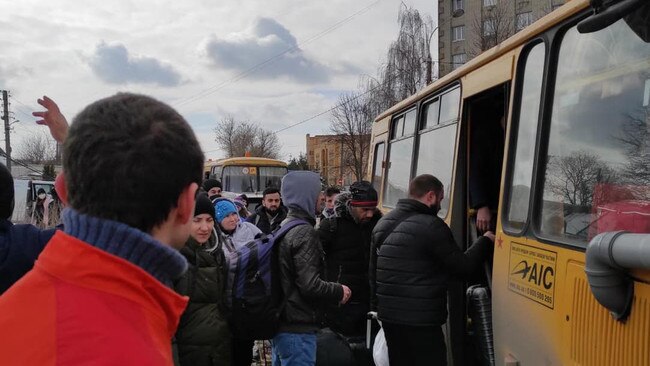
Putin likely to ‘escalate’ situation
Despite Russia facing continued setbacks in its invasion of Ukraine, Ukrainian, officials have warned Vladimir Putin is unlikely to back down.
The longstanding president in Moscow has been “stewing in a combustible combination of grievance and ambition for many years,” CIA Director William Burns said.
He called the invasion of Ukraine a matter of “deep personal conviction” for Putin, his latest defiant clash with Europe and the United States.
“I think Putin is angry and frustrated right now. He’s likely to double down and try to grind down the Ukrainian military with no regard for civilian casualties,”
Speaking to the House Intelligence Committee, US Director of National Intelligence Avril Haines said the world should expect the Russian leader to “escalate” the conflict.
“Our analysts assess that Putin is unlikely to be deterred by such setbacks and instead may escalate, essentially doubling down to achieve Ukrainian disarmament, neutrality [and] to prevent it from further integrating with the US and NATO if it doesn’t reach some diplomatic negotiation,” she said.
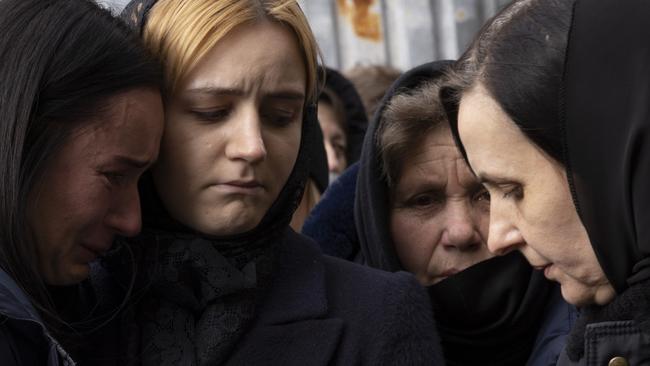
Russian forces have been met with fierce resistance from Ukraine and the country has been hit hard by repeated sanctions from the west.
“We assess Putin feels aggrieved the West does not give him proper deference and perceives this as a war he cannot afford to lose,” Ms Haines said.
“But what he might be willing to accept as a victory may change over time given the significant costs he is incurring.”
She added Mr Putin “probably” still has confidence that his forces can defeat Ukraine, but is using the threat of nuclear weapons in order to “prevent Western support from tipping the balance and forcing a conflict with NATO.”
“Russia’s failure to rapidly seize Kyiv and overwhelm Ukrainian forces has deprived Moscow of the quick military victory that it probably had originally expected would prevent the United States and NATO from being able to provide meaningful military aid to Ukraine,” Ms Haines said.
Russian soldiers hit with ‘torture’ accusations
Vile accusations have emerged against Russian soldiers, with Ukraine’s energy minister claiming hostages at a nuclear facility are being tortured.
In a social media post, Herman Halushchenko claimed staff at the Zaporizhzhia Nuclear Power Plant are being held hostage by hundreds of soldiers.
Officials believe the workers are have been forced to make a public statement that will be used for Russian “propaganda”.
“Russian occupation forces torture the operating staff of the Zaporizhzhia Nuclear Power Plant,” he said.
“According to our information, occupiers compelled the Plant’s management to record an address that they plan to use for propaganda purposes.”
Staff at the plant have been held hostage for at least four days after about 500 Russian soldiers overwhelmed the facility.
“The employees of the station are physically and psychologically exhausted,” Mr Halushchenko said.
“We call our international partners to take all measures to withdraw Russian occupation forces from captured nuclear objects and close the sky over Ukraine.
“A breakdown at a nuclear power plant due to the use of weapons by Russian troops will lead to a disaster for the whole of Europe. The responsibility for this will be entirely on Russia.
“If a breakdown happens, Europeans will be forced to switch the comfort of their homes to radiation shelters.”
Bioweapon rumour hints at Putin’s next move
The United States said Tuesday it was working with Ukraine to prevent invading Russian forces from seizing biological research material amid concern governments or unscrupulous actors might try to use such items to create bioweapons.
“Ukraine, Ukrainian has biological research facilities, which in fact we are now quite concerned Russian troops, Russian forces, may be seeking to gain control of,” senior State Department official Victoria Nuland told US lawmakers at a hearing when asked directly whether Ukraine has bioweapons.
“So we are working with the Ukrainians on how they can prevent any of those research materials from falling into the hands of Russian forces should they approach.”
US Senator Marco Rubio noted there were “Russian propaganda” reports claiming the discovery of a plot by Ukrainians to release biological weapons, with co-ordination from NATO.
Asked by Rubio if a biological or chemical weapon attack were to occur inside Ukraine, whether Russians would be behind it, Nuland asserted: “There is no doubt in my mind, senator.”
“And it is a classic Russian technique to blame on the other guy what they’re planning to do themselves.”
On March 6, Moscow’s foreign ministry tweeted that Russian forces found evidence that Kyiv was “eradicating traces of the military-biological program in Ukraine,” financed by the Pentagon.
The Atlantic Council, a think tank headquartered in Washington, says the Kremlin was seeking to justify its invasion by pushing a false narrative that Ukraine was developing dirty bombs and biological weapons.
Fresh fears for Chernobyl
Systems in place to monitor nuclear material at Chernobyl have stopped transmitting safety data, the international nuclear watchdog has warned.
“The Director General also indicated that remote data transmission from safeguards monitoring systems installed at the Chernobyl NPP had been lost,” the International Atomic Energy Agency (IAEA) said.
“The Agency is looking into the status of safeguards monitoring systems in other locations in Ukraine and will provide further information soon.”
Russian troops took Chernobyl – the site of the world’s worst nuclear disaster in 1986 – on February 24.
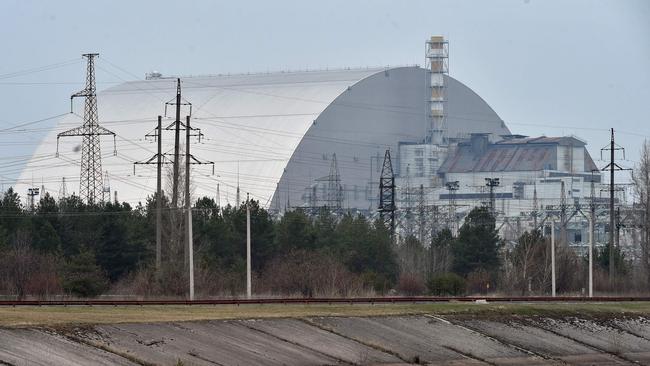
Since then, more than 200 technical personnel and guards have been trapped at the site, with growing fears about their safety and wellbeing.
Staff are reportedly unable to rotate, with IAEA Director General Rafael Grossi I stressing “the importance of operating staff being able to rest to carry out their important jobs safely and securely”.
There are ongoing concerns for the welfare of the workers, with reports staff have been limiting themselves to one meal per day as they don’t know how long they will be trapped.
The site is also not set up for sleeping, with temporary dormitories created, including makeshift beds on tables and the floor.
“I’m deeply concerned about the difficult and stressful situation facing staff at the Chernobyl nuclear power plant and the potential risks this entails for nuclear safety. I call on the forces in effective control of the site to urgently facilitate the safe rotation of personnel there,” Mr Grossi said.
Russia’s economy collapses as companies boycott
Russia’s economy is rapidly collapsing under the weight of heavy sanctions from Western nations, with the rouble falling to a record low on Monday.
Local markets are closed for trading until at least Wednesday, with the rouble losing nearly 50 per cent of its value since the start of the year, with Ukraine, Ukrainian invasion causing losses to accelerate.
Ruble has hit 140. Absolute madness
— Matthew Luxmoore (@mjluxmoore) March 7, 2022
It comes as major companies such as McDonald’s, Pepsi, Coca-Cola and Starbucks have joined in on a boycott of Russia, temporarily suspending their business in the country.
“Our hearts are with the people who are enduring unconscionable effects from these tragic events in Ukraine,” the Coca-Cola said in a statement.
PepsiCo CEO Ramon Laguarta said the company would be suspending capital investments and all advertising and promotional activities in Russia along with stopping the sale of Pepsi products.
“As a food and beverage company, now more than ever we must stay true to the humanitarian aspect of our business,” Mr Laguarta said.
“That means we have a responsibility to continue to offer our other products in Russia, including daily essentials such as milk and other dairy offerings, baby formula and baby food.”
Starbucks CEO Kevin Johnson said the company would provide support to its nearly 2000 employees who live in Russia during the shut down.
In announcing its Russia shutdown, McDonald’s said “we cannot ignore the needless human suffering unfolding in Ukraine.”
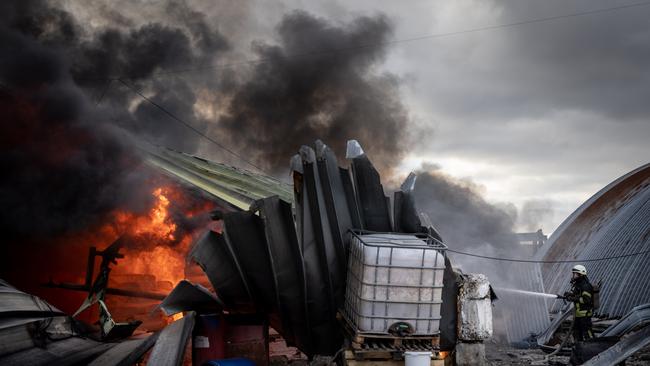
Nine of Putin’s commanders killed
Nine of Vladimir Putin’s military commanders have now been killed in Russia’s invasion of Ukraine.
They are among the 12,000 Russian troops Ukraine now claims it has killed, as one Kremlin official has reportedly described the campaign to subdue its neighbour as a “clusterf**k”, reports The Sun.
The latest senior commander to die is Major General Vitaly Gerasimov, who was killed in fighting outside Ukraine’s second city Kharkiv.
Gerasimov was awarded a medal for “capturing” the disputed province of Crimea in 2014, and also received medals after leading troops in Syria and in the second Chechen war.
Three other top commanders have were killed in recent fighting in Ukraine.
Lieutenant Colonel Dmitry Safronov, who led a Marine brigade, died along with Lieutenant Colonel Denis Glebov and Colonel Konstantin Zizevsky, who led air assault troops.
Ukraine, Ukrainian President’s request that could risk all-out war
In his historic address to the UK Parliament, Ukraine’s President Volodymyr Zelensky made a request that Western leaders fear could risk an all-out war with Russia.
During his 10 minute speech, which in parts echoed Winston Churchill’s landmark address to the House of Commons in June 1940, Mr Zelensky made a desperate plea to Western leaders for more help.
Echoing our own wartime legend, Mr Zelensky said: “We will not give up, and we will not lose. We will fight to the end.
“On the sea, in the air. We will fight for our land whatever the cost. We will fight in the forests, in the fields, on the shores, in the streets.”
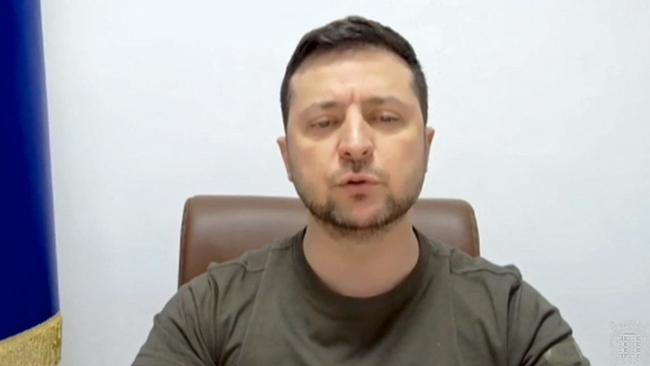
Appealing directly to British Prime Minister Boris Johnson, he said: “But please increase the pressure of sanctions against this country. And please recognise this country as a terrorist state.
“And please make sure that our skies are safe.
“Please make sure that you do what needs to be done and what is stipulated by the greatness of your country.”
The speech received a rare standing ovation from the UK parliament, with Mr Johnson saying his words “moved the hearts of everybody in this House”.
However, he has warned that NATO enforcement of a no-fly zone would risk all-out war with nuclear-armed Russia.
Mr Johnson vowed the West would press on with arms supplies to Ukraine and further sanctions, after the US and UK announced a ban on Russian oil.
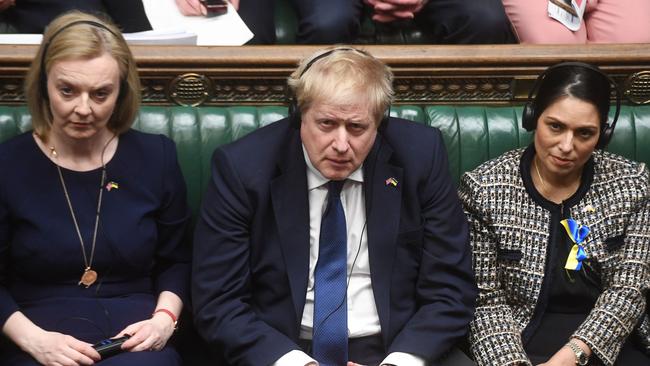
Starbucks joins in on Russia boycott
Starbucks has followed McDonald’s suit, saying they will temporarily closed all of their outlets in Russia in response to Ukraine, Ukrainian invasion.
The company has about 130 locations in Russia and Ukraine, with CEO Kevin Johnson saying Starbucks would provide support to its nearly 2000 employees who live in Russia during the shut down.
“We condemn the unprovoked, unjust and horrific attacks on Ukraine by Russia, and our hearts go out to all those affected,” Johnson wrote in a separate letter released on Friday.
Russia promises new ceasefire for Wednesday
Russia has once again promised to hold a humanitarian ceasefire in Ukraine in order to allow citizens to flee.
“From 10:00 MSK (6pm AEDT) on March 9, 2022, the Russian Federation is declaring a ‘regime of silence’ and is ready to provide humanitarian corridors,” a cell of the Russian defence ministry charged with humanitarian operations in Ukraine said Tuesday.
Russia is reportedly set to agree to the routes and start time of the humanitarian corridors before 3am local time (11am AEDT).
Civilian evacuations took place on Tuesday morning, in particular from the town of Sumy, where two convoys left during the day.
Evacuations also took place outside the capital Kyiv.
But attempted evacuations from the port town of Mariupol have failed on several occasions in recent days, with both Kyiv and Moscow blaming the other side for the failures.
The UK Ministry of Defence has also accused Russian forces of targeting evacuation corridors and killing “several citizens” trying to flee the town of Irpin.
President Volodymyr Zelensky also accused Moscow’s troops of scuppering evacuation efforts by mining roads and destroying buses meant to carry people to safety.
Kyiv had rejected a previous proposal for evacuation corridors as many of the routes led straight into Russia or its ally Belarus.
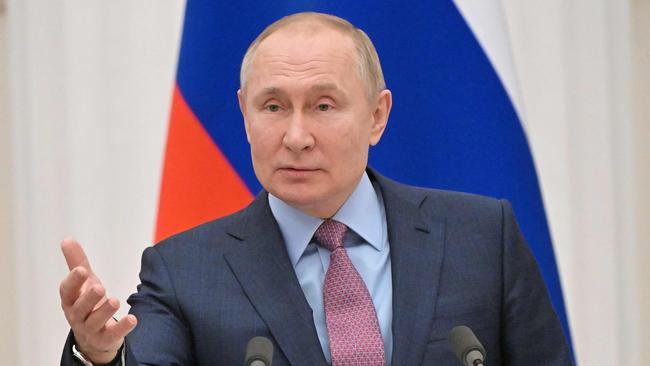
McDonald’s big move in Russia conflict
McDonald’s on Tuesday became the latest on the growing list of US multinational companies to suspend activities in Russia, joining Apple, Levi’s and others – but some have chosen to stay in the country despite the risks to their reputation.
Following last month’s invasion of Ukraine, the pressure has been mounting and calls for repercussions appeared on social media under hashtags such as #BoycottMcDonalds and #BoycottPepsi.
“McDonald’s has decided to temporarily close all our restaurants in Russia and pause all operations in the market,” the fast-food giant announced.
While lamenting the impact on 62,000 people employed at 850 restaurants in Russia, the company said, “we cannot ignore the needless human suffering unfolding in Ukraine.”
New York state’s pension fund chief Thomas DiNapoli had sent letters to companies operating in the country saying they “need to consider whether doing business in Russia is worth the risk during this extraordinarily volatile time.”
The messages went to McDonald’s, as well as Pepsi, snack manufacturer Mondelez, cosmetics groups Estee Lauder and Coty, and brokerage firm Bunge.
Russia makes major gas threat
Russia says a proposed ban on its oil would have “catastrophic consequences” for the global economy and said it may sever the main gas pipeline to Germany in retaliation.
Deputy Prime Minister Alexander Novak said a “rejection of Russian oil would lead to catastrophic consequences for the global market”, causing prices to more than double to $300 a barrel.
US President Joe Biden banned imports of Russian oil on Tuesday to punish Moscow for its invasion of Ukraine.
Britain said it would also phase out Russian oil by the end of the year and the EU planned to slash gas imports by two-thirds, as Western sanctions finally began to target the economic lifeline for Russia’s war.
Washington and its allies meanwhile have been exploring a potential oil ban as a way of hitting Russia’s economy for its invasion of Ukraine.
– with AFP
Originally published as Russia Ukraine conflict live updates: China slams NATO over conflict’s ‘breaking point’, UK bans all Russian aircraft


